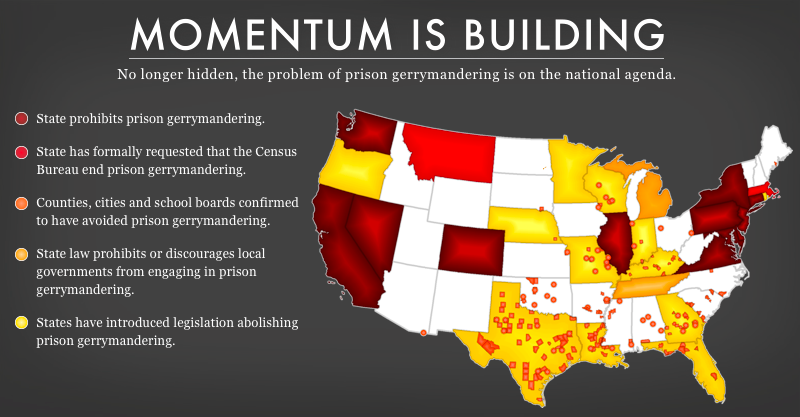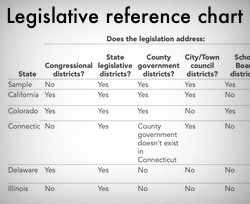Pennsylvania ending prison gerrymandering, Montana close behind
Pennsylvania and Montana poised to become first states to end prison gerrymandering without legislation, a solution the Prison Policy Initiative has recommended in other states as well. New Jersey expands its law to cover congressional and local districts.
by Mike Wessler, August 31, 2021
Redistricting has officially begun across the country, and over the last few weeks, several states have taken important steps to ensure people who are incarcerated are counted at their homes when new districts are drawn rather than in a prison cell.
The most significant of these victories occurred in Pennsylvania, where Rep. Joanna McClinton worked with advocates to add that state to the growing list of places that have ended the practice of prison gerrymandering when drawing legislative districts. This victory was particularly important because instead of relying on legislation, the independent Legislative Reapportionment Commission decided to end the practice on its own, making it the first state to do so. In urging other members of the commission to take this step, McClinton made the implications of the decision clear when she said, “We cannot wait another ten years. The time to correct this injustice is right now.”
The Keystone State may have been the first to address prison gerrymandering through its independent redistricting commission, but it likely won’t be the last. In Montana, a bipartisan consensus has formed on the need to fix the problem. Members of the state’s redistricting commission recently voted unanimously to take steps toward ending prison gerrymandering in legislative redistricting. They also are asking the state’s governor and congressional delegation to take action to help end the practice and urging the U.S. Census Bureau to end prison gerrymandering nationwide–a step we’ve advocated that the agency take for nearly twenty years.
Finally, lawmakers in New Jersey, a state that previously ended prison gerrymandering in legislative redistricting, recently voted to expand their law to make it apply to congressional and local government redistricting as well. The measure was recently signed by Gov. Phil Murphy.

The next few months are sure to be a whirlwind, but it is still not too late for state and local governments to ensure equal representation for their residents. As we’ve seen in Pennsylvania and Montana, states can use their redistricting commissions to solve this issue without legislation. Similarly, cities, counties, and school boards can use information contained in the recently released census data to avoid prison gerrymandering when drawing their new districts.
The redistricting decisions made over the coming weeks and months will have implications for the next decade. As of today, 40% of the country lives in a state, county, or municipality that has formally rejected prison gerrymandering. While new lines are drawn over the coming months, we’re committed to growing this number further.




